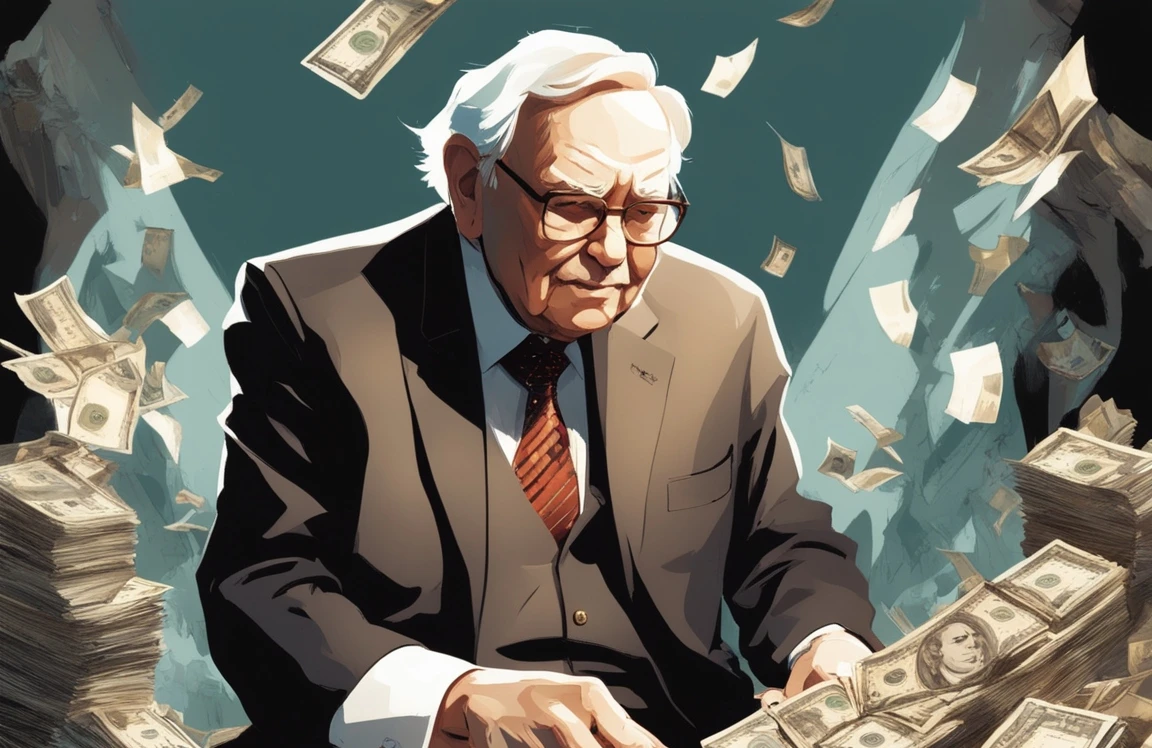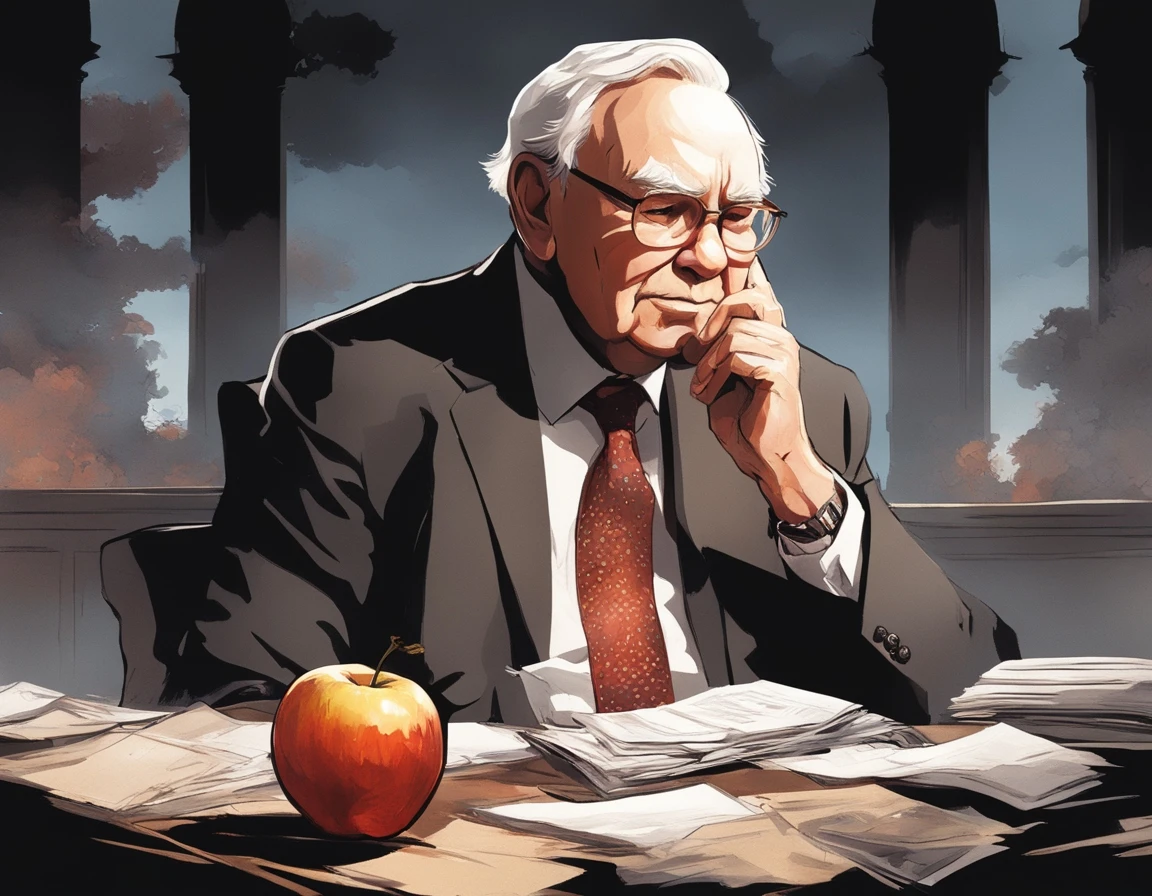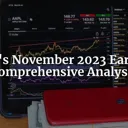Tags: Earnings / Share Buyback / Apple
This fanpage is not officially affiliated with Berkshire Hathaway: Disclaimer
Berkshire Hathaway's Q2 2024 results reveal record cash reserves of $277 billion and impressive operating earnings of $11.6 billion, showcasing Warren Buffett's strategic genius. Understand the company's prudent stock sales and the performance of its subsidiaries.

Introduction
Berkshire Hathaway's Q2 2024 financial performance stands as a testament to the company's enduring strength and strategic acumen ↗. Under the legendary leadership of Warren Buffett, Berkshire has once again shattered records, amassing an unprecedented $276.9 billion in cash reserves and reporting robust operating earnings. This remarkable achievement not only underscores Berkshire's financial prowess but also highlights its ability to navigate complex market landscapes with precision and foresight.
Berkshire Hathaway's storied history is replete with financial milestones and strategic decisions that have cemented its reputation as a titan of industry. From its humble beginnings as a textile manufacturing company to its transformation into a diversified conglomerate, Berkshire's journey has been marked by astute investments and prudent risk management. The latest quarterly results are a continuation of this legacy, reflecting the company's unwavering commitment to long-term value creation.
The purpose of this article is to provide shareholders with a comprehensive analysis of Berkshire Hathaway's Q2 2024 results, highlighting key achievements and strategic moves. We will delve into the factors driving the record-breaking cash reserves, the rationale behind significant stock sales, and the performance of various sectors within the conglomerate. Additionally, we will explore how these results align with Berkshire's long-term goals and shareholder value.
Central to Berkshire's success is Warren Buffett's investment philosophy, which emphasizes value investing, patience, and a keen eye for opportunities. Buffett's approach has consistently delivered impressive returns, even in the face of market volatility and economic uncertainty. His cautious yet opportunistic stance has been instrumental in shaping Berkshire's strategic direction and ensuring its resilience.
The broader economic environment in Q2 2024 has been characterized by a 12% increase in the S&P 500, record-high stock market levels, and fluctuating interest rates. These macroeconomic trends have influenced Berkshire's strategic decisions, including its substantial stock sales and conservative cash management. Understanding the economic backdrop is crucial to appreciating the significance of Berkshire's Q2 results.
The Q2 2024 results are particularly significant in the context of Berkshire Hathaway's long-term goals. The record cash reserves and strong operating earnings not only enhance the company's financial stability but also position it to capitalize on future opportunities. For shareholders, these results reaffirm Berkshire's commitment to delivering sustainable value and navigating market uncertainties with confidence.
In the following sections, we will explore the key topics that define Berkshire's Q2 results, including the unprecedented cash reserves, strategic stock sales, sector performance, and the enhancement of shareholder value. Each section will provide detailed insights and analysis, offering a comprehensive understanding of Berkshire's latest achievements.
Record Cash Reserves
Berkshire Hathaway's cash reserves have reached an unprecedented $277 billion, a staggering increase from the previous record of $189 billion in Q1 2024 2. This monumental cash pile not only sets a new benchmark for the company but also underscores its strategic foresight and disciplined approach to capital management.
One of the key drivers behind this record cash level is the significant stock sales executed in Q2 2024. Warren Buffett sold over $75 billion in equities during the quarter, bringing the total stock sales in H1 2024 to over $90 billion 2. Notably, Buffett reduced Berkshire's stake in Apple by nearly half ↗ and trimmed its second-largest stake, Bank of America, for 12 consecutive days in Q3 2024 2 ↗. These strategic sales reflect Buffett's cautious stance on market conditions and his preference for low-risk, high-reward investments.
Buffett's cautious approach is not new. Throughout Berkshire's history, he has consistently prioritized financial stability and prudent risk management. During the 2008 financial crisis, for example, Berkshire held substantial cash reserves, which allowed the company to capitalize on distressed assets and make opportunistic investments. This historical perspective highlights the importance of maintaining liquidity in uncertain times and seizing opportunities when they arise.
Economic factors have also played a significant role in Berkshire's decision to hold cash. Market volatility, fluctuating interest rates, and geopolitical uncertainties have all contributed to a cautious investment environment. By holding a significant portion of its cash in Treasury bills—amounting to $234.6 billion 3—Berkshire ensures that its capital is secure and readily available for future opportunities. Buffett has referred to Treasurys as “the safest investment there is” 3, underscoring his commitment to preserving capital.
Looking ahead, the record cash reserves position Berkshire Hathaway to pursue a range of potential opportunities. These could include acquisitions, share buybacks, or strategic investments in undervalued assets. While Buffett has indicated that “essentially no candidates” currently meet Berkshire’s investment criteria 3, the substantial cash reserves provide the flexibility to act swiftly when attractive opportunities arise.

Operating Earnings: A Testament to Core Strengths
Berkshire Hathaway's operating earnings for the second quarter of 2024 reached an impressive $11.6 billion, marking a 15% increase from the same period last year 2. This growth underscores the enduring strength of Berkshire's core businesses, even amidst a landscape of economic uncertainty and market volatility.
The robust performance in operating earnings is a testament to the diversified and resilient nature of Berkshire's portfolio. The insurance segment played a pivotal role in this success, with significant contributions from both underwriting profits and investment income. In Q2 2024, insurance underwriting after-tax earnings rose by $1.0 billion, while after-tax earnings from insurance investment income increased by $951 million compared to Q2 2023 1 ↗. This remarkable growth highlights the efficacy of Berkshire's insurance operations in navigating market challenges and capitalizing on investment opportunities.
A standout performer within the insurance segment was GEICO, which reported $1.8 billion in underwriting earnings before taxes in Q2 2024, a substantial increase from $514 million a year ago 2 ↗. This turnaround can be attributed to higher average premiums per auto policy, lower claims frequencies, and improved operating efficiencies. Despite facing rising claims severity, GEICO's strategic efforts to enhance technology and streamline operations are bearing fruit, positioning the company for continued profitability and growth 7.
Beyond insurance, Berkshire's diverse business segments delivered mixed results. The BNSF Railway saw a 2.9% decline in after-tax earnings compared to Q2 2023, reflecting challenges in the transportation sector 1 ↗. Meanwhile, Berkshire Hathaway Energy (BHE) experienced a $130 million decrease in after-tax earnings, partly due to accruing for wildfire losses 1. The manufacturing, service, and retailing sectors also faced headwinds, with after-tax earnings decreasing by 5.3% year-over-year 1 - amounts in million dollars:
| Q2 2024 | Q2 2023 | |
|---|---|---|
| Insurance – underwriting | 2,263 | 1,247 |
| Insurance – investment income | 3,320 | 2,369 |
| BNSF | 1,227 | 1,264 |
| Berkshire Hathaway Energy (“BHE”) | 655 | 785 |
| Pilot Travel Centers (“Pilot”) | 171 | 114 |
| Manufacturing, service and retailing | 3,209 | 3,389 |
| Non-controlled businesses* | 220 | 535 |
| Investment gains | 18,750 | 25,869 |
| Other | 533 | 340 |
| Net earnings attributable to Berkshire Hathaway shareholders | 30,348 | 35,912 |
| Net operating earnings (excluding investment gains) | 11,598 | 10,043 |
Despite these sector-specific challenges, Berkshire's overall operating earnings demonstrate consistent growth and resilience through economic cycles. The company's ability to maintain and even enhance profitability in diverse market conditions is a testament to its robust business model and strategic management.
The strategic leadership of Warren Buffett, Greg Abel, and Ajit Jain has been instrumental in driving operational efficiency and profitability across Berkshire's vast portfolio 7. Let's have a bit closer look at Berkshire's subsidiaries.
Insurance. Berkshire Hathaway's insurance segment continues to be a cornerstone of its robust financial performance. In Q2 2024, the insurance underwriting after-tax earnings surged by $1.0 billion compared to Q2 2023, underscoring the segment's resilience and operational excellence 1. Additionally, insurance investment income saw an impressive increase of $951 million year-over-year 1. The absence of significant catastrophe events during the first half of 2024 further bolstered the segment's profitability 7. Notably, GEICO reported $1.8 billion in underwriting earnings before taxes in Q2 2024, a substantial rise from $514 million a year ago 2. Ajit Jain, Vice Chairman of Insurance, acknowledged GEICO's progress while highlighting the ongoing efforts to enhance technological capabilities by the end of 20257.
Railway. The performance of BNSF Railway remained relatively stable, with after-tax earnings experiencing a modest decline of 2.9% in Q2 2024 compared to the previous year 1. Despite this, BNSF's profit margins have shown signs of improvement, thanks to ongoing efforts to enhance profitability and efficiency 7. Greg Abel, Vice Chairman of Non-insurance, emphasized the need for a competitive cost structure and noted the "excellent progress" made in this regard 7. BNSF's net operating earnings fell by 3% versus Q2 2023, but pre-tax earnings saw a slight increase of 0.4%7.
Berkshire Hathaway Energy (BHE) faced challenges in Q2 2024, with after-tax earnings decreasing by $130 million compared to the same period in 2023 1. The decline was primarily due to accruing $251 million for wildfire losses 7. Despite these setbacks, BHE continues to provide steady and growing earnings, supported by significant tax credits from renewable electricity generation 7. The outlook for renewable energy investments remains positive, positioning BHE for long-term growth in this sector.
The manufacturing, service, and retailing segment experienced a 5.3% decline in after-tax earnings in Q2 2024 compared to Q2 20231. This decline can be attributed to economic headwinds and increasing competitive pressures. For instance, Nebraska Furniture Mart and other furnishings retailers saw an 8.5% sales decline due to lower customer traffic and heightened price competition7. Similarly, nearly all other retailers within Berkshire generated lower earnings in 2024 compared to 2023, reflecting the challenging business conditions7.
Berkshire Hathaway Automotive (BHA) reported an 8.2% decline in earnings in Q2 2024, driven by lower gross profit margins on higher new vehicle sales 7. The segment faced increased price competition and changes in product mix, impacting overall profitability. Despite these challenges, BHA continues to adapt its strategies to navigate the competitive landscape.
Precision Castparts (PCC) demonstrated a notable recovery, with pre-tax earnings rising by 27.5% relative to 20237. This improvement was driven by sales increases and enhanced manufacturing and operating efficiencies. Management remains optimistic about the long-term growth prospects for air travel and aerospace products, which are expected to drive continued demand for PCC's offerings7.
Investment gains played a significant role in Berkshire's financial performance, although they experienced volatility. In the first six months of 2024, Berkshire recorded substantial net unrealized gains and losses from equity securities 1. Additionally, after-tax foreign currency exchange rate gains amounted to $1.0 billion in Q2 2024, compared to $465 million in Q2 2023 1. While these gains contribute to overall earnings, Warren Buffett has cautioned investors about the potential for quarterly fluctuations in unrealized gains on investments, which can be "extremely misleading" 2.
However, it is quite clear whether Buffett is a net seller or buyer of equities. Recently, the trend has been unmistakable. Let's take a closer look.

Strategic Sales: Navigating Market Uncertainty
In Q2 2024, Berkshire Hathaway made significant strategic sales, reflecting a cautious approach to market uncertainty and a focus on optimizing its financial portfolio.
One of the most notable moves was the reduction of Berkshire's stake in Apple by nearly half, selling approximately 390 million shares 3. This decision, while surprising to some, aligns with Warren Buffett's disciplined investment philosophy. Despite Buffett's previous praise for Apple as a "wonderful business," the sale likely reflects a strategic rebalancing of the portfolio and a response to the stock's high valuation 5.
Berkshire also trimmed its stake in Bank of America for 12 consecutive days in Q3 2024 2 ↗. This move, coupled with the significant Apple stake reduction, suggests a broader strategy of reducing exposure to certain equities amid market volatility. Analyst Cathy Seifert noted that these sales appear to be responsible portfolio management, preparing Berkshire for potential economic downturns 5.
The substantial stock sales, totaling over $75 billion in Q2 2024, can be interpreted as a bearish signal, indicating caution about the current market environment 5. With stocks experiencing significant sell-offs and economic indicators pointing to potential slowdowns, Berkshire's actions reflect a prudent approach to managing risk and preserving capital. That's the "Never Lose Money" paradigm in action.
Berkshire's history of making significant portfolio adjustments during times of market uncertainty provides valuable context. Past instances of strategic sales have often positioned the company to capitalize on future opportunities, reinforcing its reputation for astute investment decisions.
The broader economic context, including stock market performance, interest rates, and macroeconomic trends, further underscores the rationale behind these sales. With the Nasdaq Composite entering correction territory and expectations for a Fed rate cut rising, Berkshire's cautious stance is well-founded 6.
Warren Buffett's previous commentary on similar sales provides additional insight into the company's strategy. Buffett emphasized the importance of investing in opportunities with minimal risk and high potential returns, stating, "We'd love to spend it, but we won't spend it unless we think [a business is] doing something that has very little risk and can make us a lot of money" 2.
Looking ahead, Berkshire's current sales and market conditions suggest a focus on preserving capital and maintaining flexibility to seize future opportunities. With a record cash reserve of $276.9 billion, Berkshire is well-positioned to navigate economic uncertainties and invest strategically when the right opportunities arise 3.
Shareholder Value: Enhancing Returns
In Q2 2024, Berkshire Hathaway repurchased $345 million of its own stock, a significant reduction from the $2 billion repurchased in each of the prior two quarters 2. This strategic decision reflects Buffett's disciplined approach to buybacks, focusing on repurchasing shares only when the price is below Berkshire’s intrinsic value, conservatively determined 7. Despite the modest repurchases, this strategy underscores the commitment to enhancing shareholder value through prudent financial management. Buffett's approach to share repurchases is deeply rooted in the concept of intrinsic value. By repurchasing shares when the market price is below the conservatively determined intrinsic value, Berkshire ensures that buybacks are accretive to shareholder value. This disciplined approach has contributed to the company's long-term growth prospects and consistent creation of shareholder value 7.
Berkshire's Class A and B shares have demonstrated strong performance, gaining about 18% year-to-date, compared to 13% for the SPDR S&P 500 ETF Trust (SPY) 4 ↗. This outperformance reflects the market's confidence in Berkshire's diversified portfolio and strategic management. Despite a slight decline of 0.86% to $428 on August 2nd 2024, the overall trajectory remains positive.
Berkshire Hathaway's stock performance has been a testament to its ability to create shareholder value over the decades. Since 2018, the company's operating earnings have grown at a 17.9% compound growth rate, while operating earnings per share have grown at 20.4% 7. This impressive track record underscores the effectiveness of Berkshire's investment strategies and operational efficiencies.
Looking ahead, Berkshire Hathaway is well-positioned to continue creating shareholder value through strategic investments, operational efficiency, and prudent financial management. The company's substantial cash reserves provide a buffer against economic downturns and offer the flexibility to seize attractive investment opportunities. Buffett's vision for Berkshire remains focused on delivering long-term value to shareholders, ensuring that the company emerges stronger from any economic challenges.
At the end of Q2 2024, shareholder equity has been at around $608 billion, up from $568 billion at the end of 2023 1. As of June 30th 2024 there were around 1.437 million Class A / 2.155 billion Class equivalent shares outstanding, down from 1.441 million Class A / 2.162 billion Class B on December 31st, 2023 due to share repurchases 1. Hence, the book value per Class B share at the end of Q2 2024 is $282, up from $262 at the end of last year 8, see table below. That's a 7.6% increase in book value over half a year!
| Metric | Q2 2024 | Q4 2023 |
|---|---|---|
| Total Shareholder Equity | $608 billion | $568 billion |
| Class B Shares Outstanding (equiv.) | 2.155 billion | 2.162 billion |
| Book Value per Class B Share | $282 😎 | $262 |
Conclusion
Berkshire Hathaway's Q2 2024 results present a remarkable narrative of resilience, strategic foresight, and unwavering commitment to long-term value creation. The company has achieved record cash reserves of $276.9 billion, a significant milestone that not only highlights its financial strength but also positions it favorably to capitalize on future opportunities. This unprecedented liquidity is a testament to Warren Buffett's disciplined approach to capital management, allowing Berkshire to navigate market uncertainties with confidence.
The operating earnings of $11.6 billion, reflecting a 15% increase from the previous year, further emphasize the robustness of Berkshire's core business segments. The impressive performance, particularly within the insurance sector, underscores the effectiveness of the company's diversified portfolio and operational excellence. This growth, alongside strategic sales that reflect a cautious yet opportunistic investment philosophy, showcases Berkshire's ability to adapt to changing market conditions while maintaining a focus on long-term profitability.
Warren Buffett's legacy as a visionary leader continues to shape Berkshire Hathaway's reputation as a titan of industry. His investment philosophy, rooted in value investing and prudent risk management, has consistently delivered impressive returns for shareholders. As the company navigates the complexities of the current economic landscape, Buffett's strategic vision remains a guiding force, ensuring that Berkshire is well-prepared to seize opportunities when they arise.
Looking ahead, the future for Berkshire Hathaway appears bright. The company's substantial cash reserves provide a buffer against economic downturns and offer the flexibility to pursue attractive investment opportunities. With a commitment to enhancing shareholder value through strategic investments and operational efficiency, Berkshire is poised for continued growth. Shareholders can take comfort in the knowledge that Berkshire's resilience and adaptability position it favorably in an evolving market.
While the broader economic environment presents challenges and uncertainties, Berkshire Hathaway's preparedness to navigate these complexities reinforces the confidence shareholders can have in the company's long-term prospects. The strategic decisions made today will undoubtedly lay the groundwork for future success, highlighting the importance of prudent financial management and a steadfast commitment to long-term investment strategies.
Berkshire Hathaway's Q2 2024 result serves as a powerful reminder of the company's enduring strength and strategic acumen. As we reflect on this latest chapter in Berkshire's storied history, it is clear that the principles of patience, discipline, and a focus on intrinsic value will continue to guide the company toward a prosperous future. Shareholders can remain optimistic, knowing that their investment is anchored in a legacy of excellence and a commitment to navigating the challenges of tomorrow.
References
-
2024 Second Quarter Report - Results of Operations - www.berkshirehathaway.com ↩↩↩↩↩↩↩↩↩↩↩↩↩↩
-
Warren Buffett raises Berkshire cash level to record $277 billion after slashing stock holdings - www.cnbc.com ↩↩↩↩↩↩↩↩↩↩
-
Key Takeaways From Berkshire Hathaway's Earnings - www.investopedia.com ↩↩↩↩↩
-
Warren Buffett's Berkshire Hathaway Q2 Operating Profit Climbs Over 15%, Cash Hoard Swells To $277B As It Dumps Significant Stake In Apple - finance.yahoo.com ↩
-
Bill Gross says don't buy the dip as stocks crash while Warren Buffett's moves hint at 'sell signal' - fortune.com ↩↩↩
-
Stocks drop, Nasdaq confirms correction as recession fears mount - www.reuters.com ↩
-
Crucial Conclusions From Berkshire Hathaway’s Second-Quarter Earnings - www.forbes.com ↩↩↩↩↩↩↩↩↩↩↩↩↩↩↩↩↩
-
Berkshire provides the values for equivalent outstanding Class A shares in "Note 19. Common" of the 10-Q 1. We hope to have not miscalculated. The method is basic and was outlined for example in "Berkshire Hathaway's per share Book Value Q3 2023" ↗. ↩












